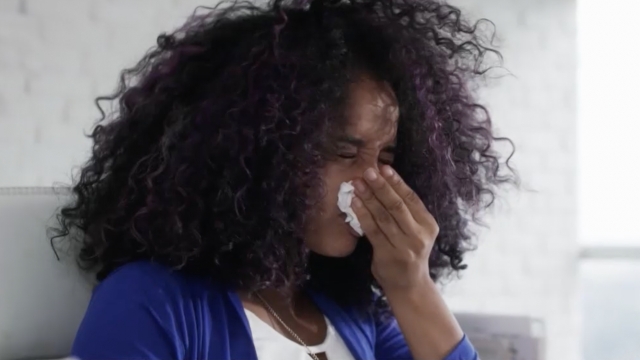The Centers for Disease Control and Prevention says as many as 60 million Americans a year are impacted by allergies, and experts say those seasonal allergies are getting less seasonal.
"The main thing is global warming or climate change has led to longer seasons, they're starting earlier and earlier," said Dr. Purvi Parikh, an allergist with the Allergy and Asthma Network.
"Not only are the seasons longer, but there's more levels of carbon dioxide in the air, which are greenhouse gases and plants feed off of that, so as a result, they produce more pollen. So not only are they producing it for longer amounts of time, they're producing it more at a higher intensity. So it's both a longer and a stronger season," she said.
Just in time for the sniffling to begin this spring, the Allergy and Asthma Foundation of America (AAFA) just released their annual report of which cities will be the most allergy-challenged this year.
Wichita, Kansas, takes the top spot, based on higher-than-average tree and grass pollen, higher-than-average medicine use and lack of allergy specialists. Virginia Beach, Virginia, Greenville, South Carolina, Dallas and Oklahoma City round out the top five.
"We are the new canary in the coal mine, because we're feeling the impacts of climate change in things like our seasonal allergies. If people are saying my allergies are a lot worse or I never had allergies before, that's because of the longer and more intense allergy seasons," said AAFA president and CEO Kenny Mendez.
While allergies will impact each area of the country differently, Mendez says climate change is the factor making it worse for everyone, including making asthma symptoms more severe. Mendez says over 10 people die every day from asthma, and allergies can be a trigger for an attack.
Dr. Parikh sees the impact allergies have on asthma in her practice frequently.
"We always see a rise in ER visits, hospitalizations this time of year due to asthma attacks," she said.
AAFA data says that growing seasons are starting earlier and lasting longer than they did 30 years ago, even showing that some parts of the country experience pollen closer to year-round. Mendez says higher temperatures can also trap heat in more urban areas too, which stimulates pollen production.
"The trees start pollinating sooner, the carbon dioxide from tailpipe emissions and other pollutants supercharges the carbon dioxide and pollen releases, people actually can feel worse allergies in urban areas," he said.
So how to prepare for the allergy season ahead? Dr. Parikh says the 24-hour over-the-counter meds, including nasal sprays, are a good bet for safe and effective treatment — but stay away from decongestants for long-term use. There are also things you can do at home, like sleeping with the windows closed, to help to reduce pollen exposure.
"We always recommend taking your shoes off, changing your clothes, showering if possible, because that washes all the pollen off of you, or not bringing it into your house and your bed when you go to sleep. And that also will reduce your constant exposure to it," said Dr. Parik.
SEE MORE: What causes fall allergies? Here's how to alleviate symptoms
Trending stories at Scrippsnews.com




